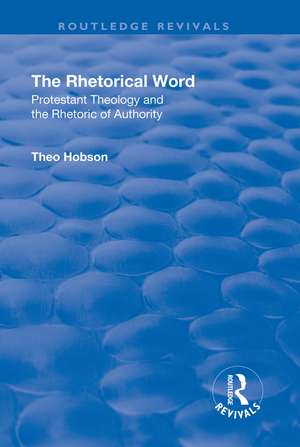The Rhetorical Word: Protestant Theology and the Rhetoric of Authority: Routledge Revivals
Autor Theo Hobsonen Limba Engleză Hardback – 3 noi 2017
| Toate formatele și edițiile | Preț | Express |
|---|---|---|
| Paperback (1) | 215.43 lei 6-8 săpt. | |
| Taylor & Francis – 29 oct 2019 | 215.43 lei 6-8 săpt. | |
| Hardback (1) | 683.01 lei 6-8 săpt. | |
| Taylor & Francis – 3 noi 2017 | 683.01 lei 6-8 săpt. |
Din seria Routledge Revivals
- 9%
 Preț: 801.71 lei
Preț: 801.71 lei - 8%
 Preț: 432.64 lei
Preț: 432.64 lei -
 Preț: 168.89 lei
Preț: 168.89 lei -
 Preț: 245.88 lei
Preț: 245.88 lei -
 Preț: 309.79 lei
Preț: 309.79 lei -
 Preț: 258.73 lei
Preț: 258.73 lei - 9%
 Preț: 764.35 lei
Preț: 764.35 lei - 9%
 Preț: 903.42 lei
Preț: 903.42 lei -
 Preț: 311.18 lei
Preț: 311.18 lei -
 Preț: 357.45 lei
Preț: 357.45 lei - 9%
 Preț: 626.93 lei
Preț: 626.93 lei -
 Preț: 317.54 lei
Preț: 317.54 lei - 9%
 Preț: 764.30 lei
Preț: 764.30 lei -
 Preț: 257.01 lei
Preț: 257.01 lei -
 Preț: 238.40 lei
Preț: 238.40 lei -
 Preț: 259.48 lei
Preț: 259.48 lei - 9%
 Preț: 938.10 lei
Preț: 938.10 lei -
 Preț: 341.33 lei
Preț: 341.33 lei -
 Preț: 264.10 lei
Preț: 264.10 lei -
 Preț: 294.98 lei
Preț: 294.98 lei -
 Preț: 308.89 lei
Preț: 308.89 lei -
 Preț: 207.40 lei
Preț: 207.40 lei -
 Preț: 347.50 lei
Preț: 347.50 lei -
 Preț: 302.59 lei
Preț: 302.59 lei -
 Preț: 389.40 lei
Preț: 389.40 lei -
 Preț: 257.01 lei
Preț: 257.01 lei -
 Preț: 358.30 lei
Preț: 358.30 lei - 9%
 Preț: 640.91 lei
Preț: 640.91 lei - 9%
 Preț: 619.49 lei
Preț: 619.49 lei -
 Preț: 228.88 lei
Preț: 228.88 lei -
 Preț: 265.16 lei
Preț: 265.16 lei -
 Preț: 257.90 lei
Preț: 257.90 lei -
 Preț: 266.06 lei
Preț: 266.06 lei -
 Preț: 258.73 lei
Preț: 258.73 lei -
 Preț: 384.01 lei
Preț: 384.01 lei -
 Preț: 246.38 lei
Preț: 246.38 lei - 9%
 Preț: 832.08 lei
Preț: 832.08 lei -
 Preț: 266.20 lei
Preț: 266.20 lei -
 Preț: 294.53 lei
Preț: 294.53 lei - 18%
 Preț: 695.86 lei
Preț: 695.86 lei - 9%
 Preț: 934.96 lei
Preț: 934.96 lei - 5%
 Preț: 243.38 lei
Preț: 243.38 lei -
 Preț: 274.69 lei
Preț: 274.69 lei -
 Preț: 208.20 lei
Preț: 208.20 lei - 9%
 Preț: 659.19 lei
Preț: 659.19 lei -
 Preț: 259.69 lei
Preț: 259.69 lei - 9%
 Preț: 1038.47 lei
Preț: 1038.47 lei -
 Preț: 389.46 lei
Preț: 389.46 lei -
 Preț: 302.14 lei
Preț: 302.14 lei -
 Preț: 302.27 lei
Preț: 302.27 lei
Preț: 683.01 lei
Preț vechi: 991.07 lei
-31% Nou
Puncte Express: 1025
Preț estimativ în valută:
130.69€ • 142.41$ • 110.13£
130.69€ • 142.41$ • 110.13£
Carte tipărită la comandă
Livrare economică 23 aprilie-07 mai
Preluare comenzi: 021 569.72.76
Specificații
ISBN-13: 9781138736658
ISBN-10: 1138736651
Pagini: 228
Dimensiuni: 155 x 232 mm
Greutate: 0.58 kg
Ediția:1
Editura: Taylor & Francis
Colecția Routledge
Seria Routledge Revivals
Locul publicării:Oxford, United Kingdom
ISBN-10: 1138736651
Pagini: 228
Dimensiuni: 155 x 232 mm
Greutate: 0.58 kg
Ediția:1
Editura: Taylor & Francis
Colecția Routledge
Seria Routledge Revivals
Locul publicării:Oxford, United Kingdom
Cuprins
Contents: Introduction: Rhetorical Origins: The rhetorical gospel (I): Biblical and anthropological roots; The rhetorical gospel (II): theoretical questions; Before Protestantism: Augustine; Protestantism: 'Non vi sed verbo': Luther and the rhetorical militancy of faith; Protestant poetics (I): the 17th century; Kierkegaard and the crisis of authority; Protestant poetics (II): Romanticism and after; The rhetorical theology of Karl Barth; Barth and Nietzsche: prophetic rhetoric regained; After Barth; Conclusion; Bibliography; Index.
Recenzii
'Theo Hobson presents a vigorous defence of Protestantism, and in its light generates powerful criticisms of almost every recent attempt to make theology comfortable in the modern academy... a fine piece of exposition and criticism... No complaints should be made about his plea for an assertive theology, theologians should surely be welcome in any healthy academic institution for the sake of what they distinctively have to offer. The problem is their loss of nerve, and this book has much to offer in remedying that, particularly in its salutary concern with truth.' Times Literary Supplement 'Ashgate is publishing some of the best academic theology right now, and this book deserves to be at the top of their very impressive list.' Reviews in Religion and Theology 'This is an unusual book of striking originality and vigour... power, authority, truth and violence are the big themes discussed by Hobson in an ambitious excursion through the tradition... This is a book with verbal punches and frequent challenges to theological complacency and I ams ure it will offend many. But it is about time theology stopped being polite, urbane and written to satisfy the demands of the educational bureaucrats - I for one am glad that this brilliant book made me feel uncomfortable...' Reviews in Religion and Theology 'This is an unusual book of striking originality and vigour.' Modern Believing 'The work [...] should provoke intense debate over the difficult question of the locus of authority in Protestant theology.' Religious Studies Review
Descriere
This title was first published in 2003:This book offers a bold reading of Protestant tradition from a rhetorical and literary perspective. Arguing that Protestant thought is based in a rhetorical performance of authority, Hobson draws on a wide range of modern and postmodern thought to defend this account of rhetorical authority from various charges of authoritarianism. With close readings of Augustine, Luther, Kierkegaard and Barth, this book develops a new 'rhetorical theology of the Word' and also a new critique of secular modernity, with particular reference to modern literature and the thought of Nietzsche. Confronting the related issues of rhetoric and authority, Hobson provides a provocative account of modern theology which offers new perspectives on theology's relationship to literature and postmodern thought.
